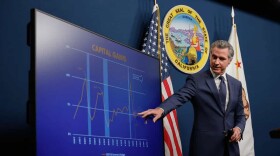SCOTT SIMON, host:
This week, the Pentagon reported to Congress that violence has dropped sharply in Iraq since February 2007 when President Bush ordered the deployment of an additional 30,000 soldiers. While there have been periods of insurgent violence there, the military said that, overall, the troop increase - or the surge, as it's become known - has been a success. NPR's Lourdes Garcia-Navarro joins us from Baghdad. Thanks so much for being with us.
LOURDES GARCIA-NAVARRO: You're welcome.
SIMON: And what is life like in Baghdad these days?
GARCIA-NAVARRO: There are about 146,000 troops in Iraq right now. And by the end of the drawdown, which should happen in about mid-July, that number is going to dip down to 142,000. If you remember, at the height of the surge, there were about 170,000 U.S. troops here. So we're looking at a 30,000-troop decrease. While the numbers have been going down, the Iraqis have been taking over more control. And we can see that on the streets, Scott. There are more checkpoints, more government troop presence.
There is a feeling of improved security. There is no doubt about it. And Iraqis are grateful. You see them going out to restaurants in the evenings in some areas. Children are playing in the parks until late in some areas. Iraqis are taking advantage of this. But there is a feeling that this is about as good as it's going to get. They still have to deal with violence and bombings, just less so. And there's a constant worry among Iraqis that things could be reignited. So people here remain very cautious.
SIMON: One of the goals of the surge was to provide a kind of breathing space so that Iraqi politicians could step in and treat with each other and create a new government. Has that happened?
GARCIA-NAVARRO: Yes and no. They haven't passed many of the key benchmarks set by the U.S., the oil law, the law that will set the date of the provincial elections. All these things have been stuck in Parliament amid infighting and wrangling. However, the Iraqi Prime Minister Nouri al-Maliki has increased his popularity, even among Sunnis, because of his targeting of the militia-loyal Shiite cleric Muqtada al Sadr and his recent operations in Basra, in Sadr City.
In Amarah, the main Sunni political groups are now working out a deal to be incorporated into the government, which is a good sign. But the progress, many feel, has only been cosmetic. There are a lot of pending issues here. What is going to happen to the Sunni tribal fighters that are paid by the U.S.? They haven't been incorporated into the security forces. It's a big issue. And the minute security gets better here, there are lots of other things that people - the things that people lack here, become glaringly obvious. Jobs, electricity, clean water, services.
The government has not stepped in to provide any of these things. And there are still 2.7 million internally displaced people here. And little has been done for them. You know, political reconciliation, people stress, Iraqis that I talked to stress, doesn't only mean what happens in Parliament. It also means that the political forces become responsive to the needs of all the sectors of society here. And we haven't seen that.
One of the things that I think gets overlooked, when we talk about the surge and its perceived successes or failures, is that even though it has slowed the massive sectarian bloodletting that we saw in 2006 and 2007, most of the neighborhoods are not ethnically mixed anymore. Sunnis live with Sunnis, Shiites live with Shiites. People don't cross over. So essentially you are not having these conflicts within certain neighborhoods that we used to see where Sunnis and Shiites would face off with the Mahdi army. That isn't happening anymore. And that's one of the reasons, I think, that we're not seeing such sectarian violence.
SIMON: NPR's Lourdes Garcia-Navarro in Baghdad. Thank you.
GARCIA-NAVARRO: You're welcome. Transcript provided by NPR, Copyright NPR.







